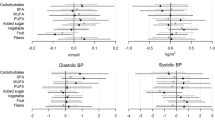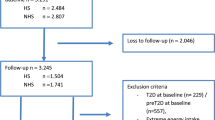Abstract
Aims
Not much is known about adherence to special diets in type 1 diabetes, characteristics of individuals with special diets, and whether such practices should raise concerns with respect to meeting the dietary recommendations. In this study, we assessed the frequencies of adherence to special diets, in a population of individuals with type 1 diabetes, and investigated the association between special diet adherence and dietary intake, measured as dietary patterns and nutrient intakes.
Methods
During the Finnish Diabetic Nephropathy Study visit, participants with type 1 diabetes (n = 1429) were instructed to complete a diet questionnaire inquiring about the adherence to special diets. The participants also completed a food record, from which energy and nutrient intakes were calculated.
Results
In all, 36.6% participants reported adhering to some special diet. Most commonly reported special diets were lactose-free (17.1%), protein restriction (10.0%), vegetarian (7.0%), and gluten-free (5.6%) diet. Special diet adherents were more frequently women, older, had longer diabetes duration, and more frequently had various diabetes complications. Mean carbohydrate intakes were close to the lower levels of the recommendation in all diet groups, which was reflected in low mean fibre intakes but high frequencies of meeting the sucrose recommendations. The recommendation for saturated fatty acid intake was frequently unmet, with the highest frequencies observed in vegetarians. Of the micronutrients, vitamin D, folate, and iron recommendations were most frequently unmet, with some differences between the diet groups.
Conclusions
Special diets are frequently followed by individuals with type 1 diabetes. The adherents are more frequently women, and have longer diabetes duration and more diabetes complications. Achieving the dietary recommendations differed between diets, and depended on the nutrient in question. Overall, intakes of fibre, vitamin D, folate, and iron fell short of the recommendations.

Similar content being viewed by others
References
Evert AB, Boucher JL, Cypress M et al (2014) Nutrition therapy recommendations for the management of adults with diabetes. Diabetes Care 37(Suppl 1):S120–S143
Lawton J, Rankin D, Cooke DD et al (2011) Dose adjustment for normal eating: a qualitative longitudinal exploration of the food and eating practices of type 1 diabetes patients converted to flexible intensive insulin therapy in the UK. Diabetes Res Clin Pract 91:87–93
Nordic Nutrition Recommendations (2012) Integrating nutrition and physical activity, 5th edn. Nordic Council of Ministers. https://www.evira.fi/globalassets/vrn/pdf/nordic-nutrition-recommendations-2012.pdf. Accessed 9 Feb 2018
Finnish Nutrition Recommendations (2014) https://www.evira.fi/globalassets/vrn/pdf/ravitsemussuositukset_terveytta-ruoasta_2014_fi_web_v4.pdf. Accessed 9 Feb 2018
Pounis G, Bonanni A, Ruggiero E et al (2017) Food group consumption in an Italian population using the updated food classification system FoodEx2: results from the Italian nutrition & HEalth survey (INHES) study. Nutr Metab Cardiovasc Dis 27:307–328
Leung B, Lauche R, Leach M et al (2017) Special diets in modern America: analysis of the 2012 National Health Interview Survey data. Nutr Health. https://doi.org/10.1177/0260106017732719
Ahola AJ, Lassenius MI, Forsblom C et al (2017) Dietary patterns reflecting healthy food choices are associated with lower serum LPS activity. Sci Rep 7:6511. https://doi.org/10.1038/s41598-017-06885-7
Ahola AJ, Mikkilä V, Mäkimattila S et al (2012) Energy and nutrient intakes and adherence to dietary guidelines among Finnish adults with type 1 diabetes. Ann Med 44:73–81
Ahola AJ, Saraheimo M, Freese R et al (2016) Fear of hypoglycaemia and self-management in type 1 diabetes. J Clin Transl Endocrinol 4:13–18
Ahola AJ, Thorn LM, Saraheimo M et al (2010) Depression is associated with the metabolic syndrome among patients with type 1 diabetes. Ann Med 42:495–501
Levey AS, Stevens LA, Schmid CH et al (2009) A new equation to estimate glomerular filtration rate. Ann Intern Med 150:604–612
Camarca ME, Mozzillo E, Nugnes R et al (2012) Celiac disease in type 1 diabetes mellitus. Ital J Pediatr. https://doi.org/10.1186/1824-7288-38-10
Hovind P, Tarnow L, Rossing K et al (2003) Decreasing incidence of severe diabetic microangiopathy in type 1 diabetes. Diabetes Care 26:1258–1264
Helldán A, Raulio S, Kosola M et al (2013) The National FINDIET 2012 Survey. https://www.julkari.fi/bitstream/handle/10024/110839/THL_RAP2013_016_%26sliitteet.pdf. Accessed 9 Feb 2018
Acknowledgements
The skilled technical assistance of Anna Sandelin, Mira Korolainen, and Jaana Tuomikangas is gratefully acknowledged. The authors also acknowledge all the physicians and nurses at each centre participating in the collection of patients (online appendix).
Funding
This study was supported by grants from Academy of Finland, Novo Nordisk Foundation, Signe and Ane Gyllenberg Foundation, Folkhälsan Research Foundation, Wilhelm and Else Stockmann Foundation, Liv och Hälsa Foundation, the Helsinki University Central Hospital Research Funds, Päivikki and Sakari Sohlberg Foundation, and Diabetes Wellness Finland. Funding agencies did not contribute to the study design, conduct of the study, data analysis, interpretation of the findings, writing of the manuscript, or in the decision to submit the manuscript for publication.
Author information
Authors and Affiliations
Corresponding author
Ethics declarations
Conflict of interest
Professor Per-Henrik Groop has received research grants from Eli Lilly and Roche, is an advisory board member for AbbVie, Astra Zeneca, Boehringer-Ingelheim, Cebix, Eli Lilly, Janssen, MSD, Medscape, Novartis, Novo Nordisk, and Sanofi. He has received lecture honoraria from Astra Zeneca, Boehringer-Ingelheim, Eli Lilly, Elo Water, Genzyme, MSD, Novartis, Novo Nordisk, and Sanofi. All other authors declare no conflicts of interest.
Ethical standard
All procedures performed in the study were in accordance with the ethical standards of the institutional research committee and with the 1964 Helsinki declaration and its later amendments or comparable ethical standards.
Informed consent
Informed consent was obtained from all individual participants included in the study.
Additional information
Managed by Massimo Federici.
Electronic supplementary material
Below is the link to the electronic supplementary material.
Rights and permissions
About this article
Cite this article
Ahola, A.J., Forsblom, C. & Groop, PH. Adherence to special diets and its association with meeting the nutrient recommendations in individuals with type 1 diabetes. Acta Diabetol 55, 843–851 (2018). https://doi.org/10.1007/s00592-018-1159-2
Received:
Accepted:
Published:
Issue Date:
DOI: https://doi.org/10.1007/s00592-018-1159-2




